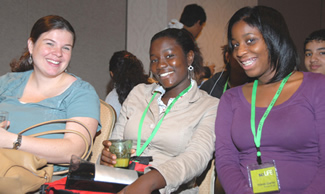| |
 |
|
|
|
|
| |
ORS director Dr. Alfred Johnson addresses an audience of high school students and their parents at SciLife. |
|
Remember the day you received your acceptance letter to the university or college
of your choice? For many, it’s one of life’s defining moments, catapulting you onto your career path. To be successful in today’s competitive market, it is crucial that students get an early jump on career planning. To help students do that, the NIH Office of Science Education (OSE) and partnering ICs and organizations held the second annual college and career-planning program
SciLife recently at L’Enfant Plaza Hotel in Washington, D.C. SciLife focuses on college planning for health care and biomedical science careers and targets underserved populations, high school students and their parents in the Washington metro area.
In 2007, participation was double that of the 2006 pilot program. Close to 200 people, students
and parents, gathered in the morning for a keynote address by Dr. Alfred Johnson, director of the Office of Research Services.
A series of breakout sessions followed, covering topics of interest to both parents and students.
Parents spilled out into the hallway of a popular
workshop, Life Skills for the 21st Century, led by OSE director Dr. Bruce Fuchs. A workshop for parents—
How Do I Get My Child into College?—was presented in Spanish by Milton Hernandez of NIAID. NLM’s Jiwon Kim offered a workshop titled CSI—Careers in Forensic Science.
“I wished the program was more than one day,” said one parent. “My daughter is only 13, but I wanted to start early.”
 |
| Parents, students and area teachers gather in a conference room of the L’Enfant Plaza Hotel for the welcoming address at SciLife. |
New to the 2007 program was SciMentorNet, a web site and e-mentoring service. It helps students who are interested in the behavioral, social, and biomedical sciences find a mentor. “The goal is to attract and retain student career interests, while helping to promote workforce diversity,” said Jonathan Arias of the Center for Scientific Review, who developed the program.
Arias partnered with Dana Sampson of the Office of Behavioral and Social Sciences Research to add mentors in the behavioral and social sciences. OBSSR already had a mentoring
program with similar goals. “We realized our collaboration would be mutually beneficial,” said Sampson.
Before leaving SciLife ’07, students received numerous freebies, including a souvenir T-shirt, an organizing binder for collecting college materials,
a backpack and several books donated by sponsoring organizations.
OSE staff members are already looking forward to the ’08 program. They hope to develop a web site and make the registration process easier. 